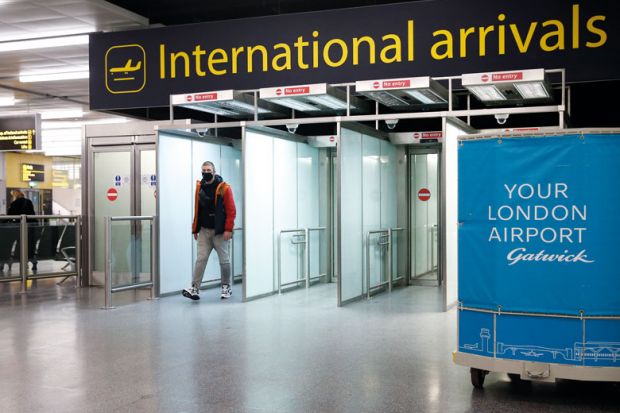The vast majority of international students leave the UK within five years, but this trend appears set to change in the coming years, according to the Office for National Statistics, as revised visa figures show that net migration hit a record high in 2022, fuelled by an increase in students from outside the European Union.
ONS figures published on 23 November upped the net migration estimate for the 2022 calendar year from 606,000 to 745,000.
The agency’s statistics also showed that net migration to the UK was 672,000 in the 12 months to June 2023.
Meanwhile, new research from the ONS shows that 83 per cent of international students who arrived in June 2018 from outside the EU had left within five years.
Although only the first few years of activity can be compared across different cohorts, that trend appears to be changing – potentially showing the effect of the UK’s post-study work visa.
Of that 2018 cohort, 37 per cent had left after one year and 66 per cent after two years.
But of those who arrived in June 2021, just 19 per cent had left after one year and 33 per cent after two years.
The ONS analysis shows that more students are transitioning to a different visa type after two years. Only 4 per cent of the June 2018 cohort had done so after two years – but this increased to 27 per cent of the June 2021 class.
The ONS said this could be because of the graduate visa, which was reintroduced in 2021 under former prime minister Boris Johnson, and because these periods crossed over with the Covid-19 pandemic.
According to the ONS, these findings suggested that emigration might continue to rise over the coming years after the increase in non-EU study-related immigration over the two years leading up to June 2023.
Madeleine Sumption, director of the Migration Observatory at the University of Oxford, said: “Given that the UK attracts so many international students, even a small change in the share who remain permanently can have an impact on net migration in the long term.”
Using a different method of research, the ONS estimates that the net migration of non-EU nationals arriving on study-related visas was 263,000 for the 12 months to June 2023.
This was similar to the estimate in the year ended June 2022, but a significant jump from 24,000 in the year to June 2019.
The ONS said this increase could be because increased immigration was yet to be “balanced” by increased emigration, following a period of growth, which might be caused by the graduate visa route.
Despite the wishes of some in the sector to remove international students from net migration figures, the ONS said it would continue to include them in its long-term international migration data – in keeping with the definition used by the United Nations.
“Regardless of whether international students leave at the end of their studies, they still contribute to population change if they reside in the UK for 12 months or more, as well as to society and the economy more broadly,” the ONS said.
Overall, the largest contributors to long-term immigration in the year ending June 2023 were non-EU workers and their family members (322,000) and non-EU international students and their family members (378,000). The Home Office’s new policy of permitting only students enrolled on postgraduate research courses to bring dependants into the UK is yet to affect the figures.
Ben Brindle, researcher at the Oxford Migration Observatory, said work and international study were now the leading factors contributing to net migration.
“Predicting what will happen next in these two categories is a challenge,” he added.
“We may see study migration start to decline once new restrictions on students’ family members come into force, but this won’t be visible in the data for some time.”
Universities UK said those arriving in the UK on study visas are typically here on a temporary basis, and the majority of students return home within a few years after their studies.
“We are pleased to see this reflected in today's statistics from the ONS and would encourage the government to send a clear message that international students are welcome in the UK, and that their contribution is both recognised and valued.”
Register to continue
Why register?
- Registration is free and only takes a moment
- Once registered, you can read 3 articles a month
- Sign up for our newsletter
Subscribe
Or subscribe for unlimited access to:
- Unlimited access to news, views, insights & reviews
- Digital editions
- Digital access to THE’s university and college rankings analysis
Already registered or a current subscriber? Login








